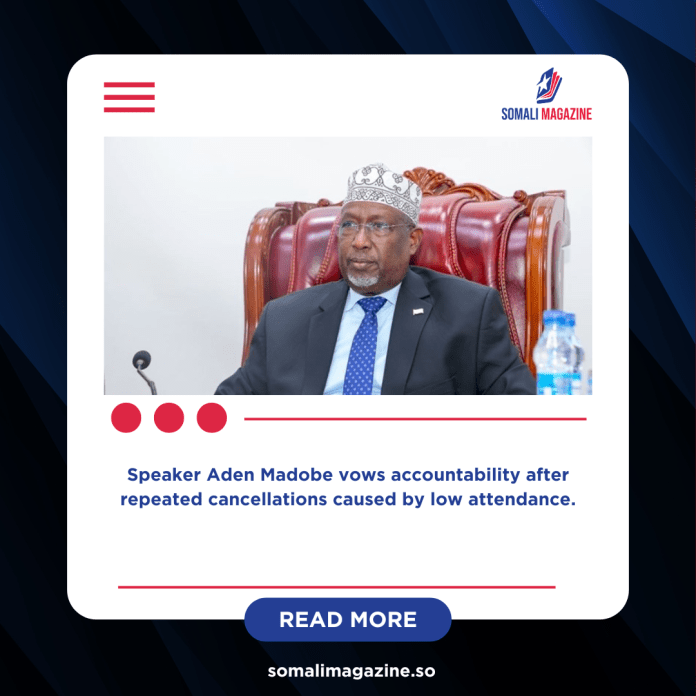Facebook Twitter (X) Instagram Somali Magazine - People's Magazine
Somalia’s Lower House is growing increasingly frustrated with lawmakers who have been missing parliamentary sessions without valid reasons. This week, two planned meetings were cancelled because there were not enough members present to proceed — a problem that has now become a recurring issue.
The Speaker of the House of the People, Sheikh Aden Madobe, and the parliamentary leadership have expressed disappointment over the growing trend of absenteeism, saying it is undermining the credibility and performance of the legislature. In Thursday’s sitting, the names of members who failed to attend previous sessions were read out publicly as part of a new push for accountability. The Speaker made it clear that this was not just about embarrassment, but about enforcing responsibility among elected representatives who are expected to serve the people diligently.
According to parliamentary rules, the Federal Parliament is required to meet three times each week — on Saturdays, Mondays, and Wednesdays — to debate laws, discuss national matters, and exercise its oversight duties. However, this week, only one of those sessions took place because many MPs failed to show up. The lack of quorum not only delays the passage of laws but also stalls discussions on key national issues that affect citizens’ lives and the country’s development.
Speaker Aden Madobe has been consistently urging lawmakers to take their work seriously. He reminded them that attending sessions is not optional but a constitutional duty. He also warned that persistent absenteeism reflects poorly on Parliament as an institution and sends the wrong message to the public, especially at a time when citizens expect leadership, unity, and progress from their representatives.
During the Thursday session, Madobe emphasized that Parliament’s role is not ceremonial. It exists to represent the people, make laws, and provide oversight to ensure transparency and good governance. When MPs fail to attend, the legislative process slows down, bills pile up, and the institution’s credibility is put at risk. “Those who continue to ignore their responsibilities will face consequences,” he said, adding that attendance records would now be made public to encourage accountability.
The Speaker also hinted that stricter disciplinary measures could be introduced to deal with repeat offenders. These could include sanctions or formal warnings to members who continuously miss sessions without valid reasons such as illness or approved leave. The leadership’s goal, he explained, is not to punish anyone unfairly but to restore discipline, ensure consistency, and rebuild public trust in Parliament’s ability to deliver on its mandate.
Observers note that absenteeism has long been a challenge in Somali politics, often blamed on weak enforcement of attendance rules and lack of institutional accountability. However, the latest warning signals a shift toward more transparency within the legislature. By reading out the names of absentees and promising to take further action, the leadership hopes to create a culture of responsibility where MPs take pride in fulfilling their duties.
In a country that continues to face security challenges, political divisions, and pressing development needs, effective governance depends heavily on an active and functioning parliament. Many Somalis view the renewed focus on attendance as a positive step toward reforming political culture and reinforcing the importance of public service.
As the Speaker concluded, the message was clear: being elected to Parliament is both an honor and a duty. Members who fail to take that duty seriously not only let down their constituents but also weaken the very foundation of Somalia’s democracy.

